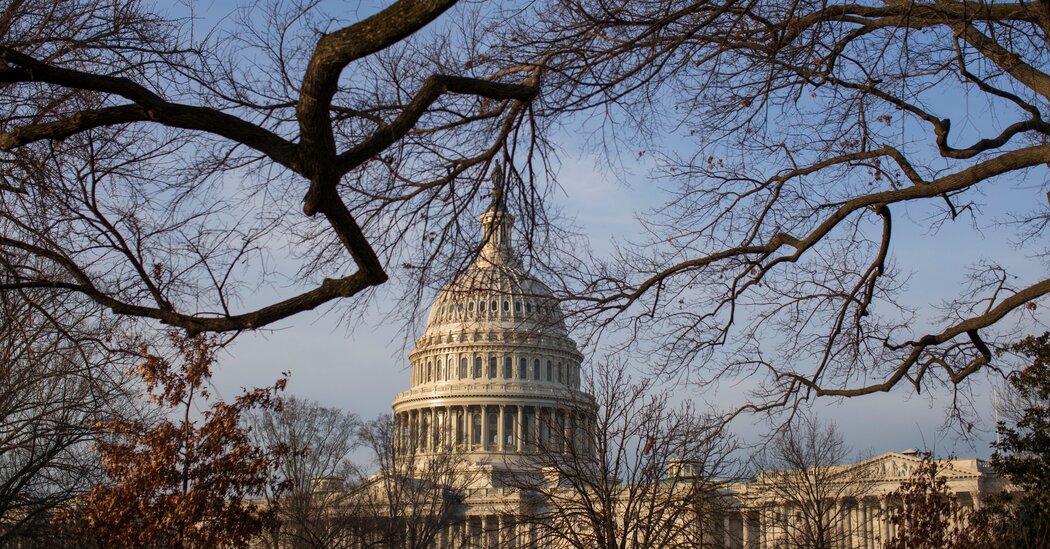Democrats used an arcane maneuver to pass the legislation, denying Republicans in the Senate the ability to block it from being brought up, as they have done four times previously.
WASHINGTON — The House passed a repackaged set of voting rights bills on Thursday, pushing past Republican opposition and hurriedly sending the legislation to the Senate to force a showdown over the fate of the measures and the reach of the filibuster.
Acting as part of a Democratic plan to expedite consideration of the bills in the Senate, the House approved the new measure on a party-line vote of 220 to 203 after a heated partisan debate in which lawmakers clashed over the state of election laws across the country.
The new legislation combined two separate bills already passed by the House — the Freedom to Vote Act and the John Lewis Voting Rights Advancement Act — and joined them in what had been an unrelated measure covering NASA. The move will allow the Senate to bring the bill directly to the floor, skirting an initial filibuster, although Republicans could still block it from coming to a final vote.
Democrats said the legislation was urgently needed to offset efforts taking hold in Republican-led states to make it more difficult to vote after Democratic gains in the 2020 elections and former President Donald J. Trump’s false claim that the vote was stolen. They argue that the flurry of new state laws is clearly intended to reduce voting in minority communities, amounting to a contemporary version of the kinds of restrictions that were prevalent before the enactment of landmark civil rights laws in the 1960s.
“There are people who don’t want you to vote and they are using every tool in the toolbox to make it harder,” said Representative Debbie Wasserman Schutz, Democrat of Florida, referring to the enactment over the past year of new voting restrictions in Republican-led states. “Voter suppression has not been consigned to the history books. It is here today, right now.”
Republicans railed against the maneuver used to pass the bill on Thursday, accusing Democrats of “hijacking” the space agency measure to push through legislation that they said represented federal intrusion into state voting operations to give an unfair advantage to Democratic candidates.
“This is one giant leap backward for American election integrity,” said Representative Tom Tiffany, Republican of Wisconsin.
Senator Chuck Schumer, Democrat of New York and the majority leader, said the Senate would begin debate on the House-passed bill as quickly as possible. It will be the Senate’s fifth attempt to consider such legislation after Republicans have used the filibuster four times to prevent the bills from even reaching the floor.
“The Senate will finally hold a debate on the voting rights legislation for the first time in this Congress,” Mr. Schumer said on Thursday. “Every senator will be faced with the choice of whether or not to pass this legislation to protect our democracy.”
While all 50 Senate Democrats are in support of the legislation, Republicans are almost uniformly opposed, leaving Democrats short of the 60 votes needed under current rules to end debate and force a final vote. President Biden urged Democrats on Tuesday to force through a rules change for the voting rights legislation to allow the party to circumvent a filibuster through a simple majority.
Understand the Battle Over U.S. Voting Rights
Why are voting rights an issue now? In 2020, as a result of the pandemic, millions embraced voting early in person or by mail, especially among Democrats. Spurred on by Donald Trump’s false claims about mail ballots in hopes of overturning the election, the G.O.P. has pursued a host of new voting restrictions.
At least two Democrats — Senators Kyrsten Sinema of Arizona and Joe Manchin III of West Virginia — have so far said they would not do so, meaning the legislation will die in the Senate if they do not change their positions. Mr. Biden was meeting with Senate Democrats on Capitol Hill on Thursday to try to persuade them.
The Freedom to Vote Act contains an array of proposals to establish nationwide standards for ballot access, aiming to nullify the wave of new restrictions in states. It would require a minimum of 15 consecutive days of early voting and that all voters are able to request to vote by mail; it would also establish new automatic voter registration programs and make Election Day a national holiday. It is a narrower version of legislation that Democrats introduced early last year but revised to suit Mr. Manchin, who said the original bill was overly broad and insisted on including a provision requiring voters to present some form of identification.
A second measure named for Representative John Lewis, the civil rights icon and former congressman who died in 2020, would restore parts of the landmark Voting Rights Act weakened by Supreme Court rulings. Among the provisions was one mandating that jurisdictions with a history of discrimination win prior approval — or “preclearance” — from the Justice Department or federal courts in Washington before changing their voting rules.
Mr. Schumer has set a Monday deadline for action, timing it to the observance of the birthday of the Rev. Dr. Martin Luther King Jr. Democrats said that deadline was appropriate.
“The right to vote has not been so endangered since Dr. King walked among us,” said Representative Steny H. Hoyer, Democrat of Maryland and the majority leader.


























